

 Translate into
German, French, Spanish Italian or Portugeuse, Russian, Japanese, Korean or
Chinese
Translate into
German, French, Spanish Italian or Portugeuse, Russian, Japanese, Korean or
Chinese Norwegian,
Norwegian,
 Danish
Danish Indonesian, Dutch
Indonesian, Dutch

THE ELIZABETHAN THEATER
There were three different types of venues for Elizabethan plays: Inn-yards, Open air Amphitheatres and Playhouses. The Inn-yards were the original venues of plays and many were converted into Playhouses. The Amphitheatres were generally used during the Summer months and then the Acting Troupes moved to the indoor playhouses during the Winter Season.
In Tudor England groups of strolling players toured the country performing plays. These plays were performed in barns and in the courtyards of inns. One of the most popular subjects of these plays was the story of Robin Hood.
The English government did not approve of strolling players as it was worried that plays on subjects such as Robin Hood would encourage the people to become rebellious. Another fear was that strolling players were responsible for spreading diseases such as the plague.
In 1572 a law was passed banning strolling players from touring the country. The only actors allowed were those employed by noblemen. During the next two years, Elizabeth gave permission for four noblemen to start their own theatre companies. However, actresses were not allowed to join. Women's parts had to be played by young boys.
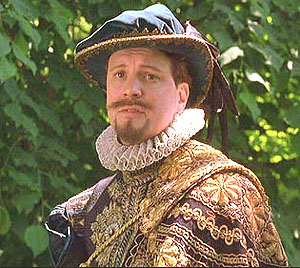 Victor Hugo Hoppe, the son of Rabbai Bernhard and Rhoda Susanna Hoppe was born on October 1, 1886 in Salem, Ohio, and died 1955. Victor Hugo Hoppe attended Denison University, a private, residential liberal arts and sciences college in Granville, Ohio, approximately 30 miles (50 km) east of Columbus. Denison was founded in 1831. He obtained his master’s degree at the University of Michigan. Then graduated from the School of Expression, in Boston. My Ashkenazi (German-Jewish) grandfather entered the career of acting, became a drama professor in Shakespeare, eventually enjoying a 40 year long career in the arts on the staff of Western Washington University. From the beginning of his career in theater, when not acting on stage, he taught speaking at Denison University. He also headed his own theater company, known as "The Varsity Drama Club." In the early years, he received his education and career on the east coast, where his dramatic style consisted of acting multi characters in play recitals, without grease paint, or scenery. He was professionally billed as "The man who isn't himself!" The circular says of him: To be ones self is good and honest, but to be many different people is to be a platform interpreter of plays. That few men in lyceum held to the distinct art of representing an entire play with living human characters. He made you forget him in the character!
Victor Hugo Hoppe, the son of Rabbai Bernhard and Rhoda Susanna Hoppe was born on October 1, 1886 in Salem, Ohio, and died 1955. Victor Hugo Hoppe attended Denison University, a private, residential liberal arts and sciences college in Granville, Ohio, approximately 30 miles (50 km) east of Columbus. Denison was founded in 1831. He obtained his master’s degree at the University of Michigan. Then graduated from the School of Expression, in Boston. My Ashkenazi (German-Jewish) grandfather entered the career of acting, became a drama professor in Shakespeare, eventually enjoying a 40 year long career in the arts on the staff of Western Washington University. From the beginning of his career in theater, when not acting on stage, he taught speaking at Denison University. He also headed his own theater company, known as "The Varsity Drama Club." In the early years, he received his education and career on the east coast, where his dramatic style consisted of acting multi characters in play recitals, without grease paint, or scenery. He was professionally billed as "The man who isn't himself!" The circular says of him: To be ones self is good and honest, but to be many different people is to be a platform interpreter of plays. That few men in lyceum held to the distinct art of representing an entire play with living human characters. He made you forget him in the character!
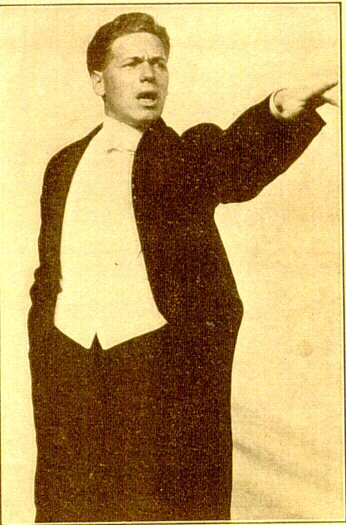
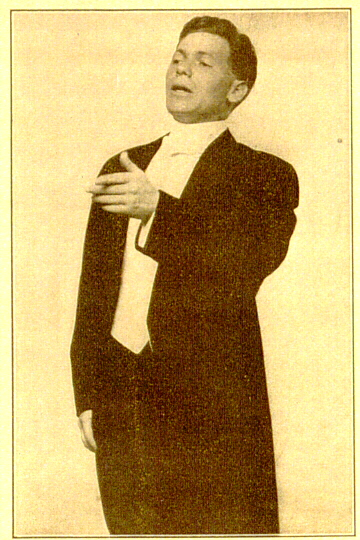
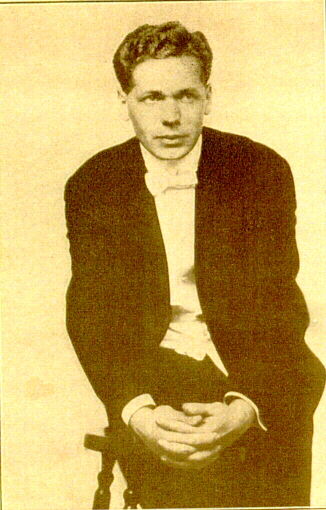
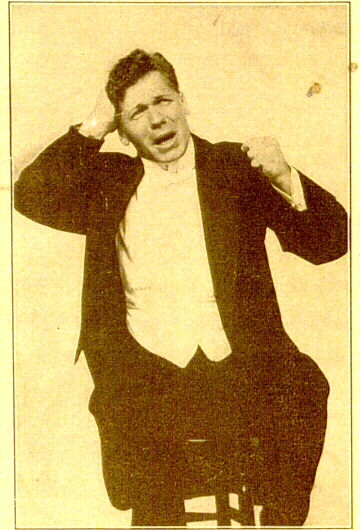
It was said of Victor Hoppe that "He makes book characters step out upon the stage--their voice, their action, their personality. He presents all the drama minus the grease paint and scenery. He changes on the instant from character to character.

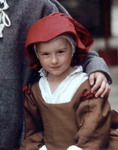 Fifteen-hundred attended, when he acted at Summerland Chautauqua, with "round after round of applause upon his interpretation of the many and difficult characters--his work was faultless, done with the ease of the artistic training of the speaker; his work truly dignified and artistic." Victor Hugo Hoppe was the son of Rabbai Bernhardt Hoppe and Rhoda Susanna Hanks Hoppe. On 15 July 1915, Victor Hoppe married Ardelle Ruth Hoppe (born-May 29, 1890) the daughter of Edwin G. (E.G.) Russell and Mary Ann "Anna" Hartman. The wedding took place in Kalamazoo, Michigan. Two children were born to them, a son and daughter; Russell Hoppe and Joan Ruth Hoppe, my mother. After marrying and moving to the west coast, Victor Hoppe taught drama at Western Washington University for some 35 years. Angus Bomer, who started the Ashland Shakespearean Festival was one of his students. Angus Livingston Bowmer was born in Bellingham, Washington, on September 25, 1904[1]. He was the only child of Charles C. Bowmer (born 19 Aug 1880, Nevada; died Feb 1967, Portland, Oregon) and Florence "Flora" (born about 1881, Wisconsin; died 05 Jun 1958, Portland, Oregon).[2]. He moved with his family at least twice, living in Mount Vernon, Washington in 1910 and Oak Harbor, Washington by 1920. He graduated from the Washington State Normal School at Bellingham (now Western Washington University) in 1923.
Fifteen-hundred attended, when he acted at Summerland Chautauqua, with "round after round of applause upon his interpretation of the many and difficult characters--his work was faultless, done with the ease of the artistic training of the speaker; his work truly dignified and artistic." Victor Hugo Hoppe was the son of Rabbai Bernhardt Hoppe and Rhoda Susanna Hanks Hoppe. On 15 July 1915, Victor Hoppe married Ardelle Ruth Hoppe (born-May 29, 1890) the daughter of Edwin G. (E.G.) Russell and Mary Ann "Anna" Hartman. The wedding took place in Kalamazoo, Michigan. Two children were born to them, a son and daughter; Russell Hoppe and Joan Ruth Hoppe, my mother. After marrying and moving to the west coast, Victor Hoppe taught drama at Western Washington University for some 35 years. Angus Bomer, who started the Ashland Shakespearean Festival was one of his students. Angus Livingston Bowmer was born in Bellingham, Washington, on September 25, 1904[1]. He was the only child of Charles C. Bowmer (born 19 Aug 1880, Nevada; died Feb 1967, Portland, Oregon) and Florence "Flora" (born about 1881, Wisconsin; died 05 Jun 1958, Portland, Oregon).[2]. He moved with his family at least twice, living in Mount Vernon, Washington in 1910 and Oak Harbor, Washington by 1920. He graduated from the Washington State Normal School at Bellingham (now Western Washington University) in 1923.
Before attended the University of Washington in Seattle in the 1930s, acting in at least two of its Shakespeare productions, Love's Labor's Lost and Cymbeline under guest director, Ben Iden Payne, an Englishman whose ideas for neo-Elizabethan staging of Shakespeare’s plays provided inspiration later in Bowmer's life as he began producing the plays that became the Oregon Shakespeare Festival. Here are some samples of reviews of his plays from the following states:
- Pawtucket, R.I. Times:
A decided hit--an entertainer with rare ability.
- The Columbus Ohio Dispatch:
A young man of unusual ability...he will make a place for himself on the stage.
- Fall River (Mass) Evening News:
Fine histrionic ability...particularly happy in "The Man From Home."
- Indianapolis Star:
Mr. V. H. Hoppe was great in Kipling.
- Jacksonville (Texas) Banner: Hoppe was a revelation...his audience was delighted ...his play-recital work is wonderful.
THE SONNET OF LIFE
 In Luke 12:1-5, Yeshua/Jesus gives serious warning to his disciples about not behaving in a way that was inconsistent with their religious beliefs in the one true God, and His Messiah.
In Luke 12:1-5, Yeshua/Jesus gives serious warning to his disciples about not behaving in a way that was inconsistent with their religious beliefs in the one true God, and His Messiah.
"Beware of the leaven of the Pharisees, which is hypocrisy. But there is nothing covered up that will not be revealed, and hidden that will not be known. Accordingly whatever you have said in the dark shall be heard in the light, and what you have whispered in the inner rooms shall be proclaimed upon the housetops. And I say to you my friends, do not be afraid of those who kill the body, and after that have no more that they can do. But I will warn you whom to fear: fear the One who after He has killed has authority to cast into hell; yes, I tell you, fear Him!
A hypocrite is an actor that plays a role, pretending to be someone or something. They perpetuate acting, because they are teachers of hypocrisy, by their own example. They profess themselves to be wise. The Lord called the Pharisees hypocrites, giving them the strongest possible condemnation. They appeared outwardly morally clean and righteous, but their hearts were not right before God. The Greek term "hupokrites" pronounced "hoop-ok-ree-tace," (hupokrinomai); means an actor under an assumed character (stage-player), i.e. (figurative) a dissembler ("hypocrite") i.e. hypocrite.
HOW DO HYPOCRITES VIEW LIFE?
 Yeshua/Jesus exhorts his followers today, to beware of the hypocrisy characterized by the lives of those that are like Pharisees. Who resemble those whom he perceived to be morally and spiritually lacking dispite of their affirmations of the Torah. Yeshua/Jesus said: Woe to you Scribes, Pharisees, Hypocrites, for you tithe mint, dill and cumin and have neglected the weightier matters of the Law: justice, mercy, and forgiveness, but these are the things you should have done without neglecting the other." (Matt. 23:23) Yeshua/Jesus denounced the lack of holy character with a vehemence much like the Prophet Isaiah, who rebuked fashion conscious Israel, when the worship of the body eclipsed the true worship of God. (Is. 3:22) He accused them of being "whitewashed tombs that appear lovely on the outside, but inside are filled with dead mens bones, and all uncleanness." (Matt. 23:27) These were the teachers of the law! Men who joined together for the purpose of instructing and encouraging one another in the observance of the Mosaic Law. Josephus, a respected first-century historian, describes the Pharisees as "having the reputation for excelling the rest of the nation in the observance of religion." He goes on to say that it was "the accurate interpretation of the Mosaic Law, and scrupulous adherence to it," that characterized the religiosity of the average Pharisee. In many ways, they were sincere men that took Torah observance seriously.
Yeshua/Jesus exhorts his followers today, to beware of the hypocrisy characterized by the lives of those that are like Pharisees. Who resemble those whom he perceived to be morally and spiritually lacking dispite of their affirmations of the Torah. Yeshua/Jesus said: Woe to you Scribes, Pharisees, Hypocrites, for you tithe mint, dill and cumin and have neglected the weightier matters of the Law: justice, mercy, and forgiveness, but these are the things you should have done without neglecting the other." (Matt. 23:23) Yeshua/Jesus denounced the lack of holy character with a vehemence much like the Prophet Isaiah, who rebuked fashion conscious Israel, when the worship of the body eclipsed the true worship of God. (Is. 3:22) He accused them of being "whitewashed tombs that appear lovely on the outside, but inside are filled with dead mens bones, and all uncleanness." (Matt. 23:27) These were the teachers of the law! Men who joined together for the purpose of instructing and encouraging one another in the observance of the Mosaic Law. Josephus, a respected first-century historian, describes the Pharisees as "having the reputation for excelling the rest of the nation in the observance of religion." He goes on to say that it was "the accurate interpretation of the Mosaic Law, and scrupulous adherence to it," that characterized the religiosity of the average Pharisee. In many ways, they were sincere men that took Torah observance seriously.
 Historically, the term translated "hypocrisy" originates as earlier stated, with Greek theater, where it is used to describe an actor, the one performing a role on stage. A good actor endeavors to portray his part as closely as possible to the script; and puts much time and effort into knowing and understanding the character he was playing.
In the role of life, the Pharisees taught the Torah. On one occasion Yeshua/Jesus said: "Do what they say, (Because they knew and taught the Torah) but not as they do!" (Because they really did not keep Torah)
As religious men--righteousness was simply a matter of behaving according to the prescribed law, or "script." Yeshua would say repeatedly: "The Law says, but I say unto you..."
Historically, the term translated "hypocrisy" originates as earlier stated, with Greek theater, where it is used to describe an actor, the one performing a role on stage. A good actor endeavors to portray his part as closely as possible to the script; and puts much time and effort into knowing and understanding the character he was playing.
In the role of life, the Pharisees taught the Torah. On one occasion Yeshua/Jesus said: "Do what they say, (Because they knew and taught the Torah) but not as they do!" (Because they really did not keep Torah)
As religious men--righteousness was simply a matter of behaving according to the prescribed law, or "script." Yeshua would say repeatedly: "The Law says, but I say unto you..."
...Teaching the Pharisees that there was a holy and moral intent to the law which the Pharisees frequently missed. Of the Sabbath, and an attack by the Pharisees on the Lord and his disciples for picking and eating grain on Shabbat, Messiah said: Have you not read what David did when he became hungry, he and his companions? Or Have you not read in the Law that on the Sabbath the priests of the Temple break the Sabbath and are guiltless? But if you had known what this means: I desire compassion and not sacrifice you would not have condemned the guiltless. For the Son of Man is Lord of the Sabbath. (Matt. 12:1-8) They had become so depraved, that they scrutinized him by manmade criterion not even within the pages of God's holy word. He said: "You make the truth of God of no effect by their traditions." When they criticized him for healing a man on the Sabbath, He rebuked them sharply saying: If there be a man among you who shall have one sheep and it falls into a pit on the Sabbath will you not take hold of it and lift it out? Of how much more value is a man than a sheep. So then it is lawful to do good on the Sabbath day! (Matt. 12:12)
A lawyer asked: What must I do to inherit eternal life? Yeshua said: What is written in the Law. How does it read for you? The man said: "You shalt love the Lord your God with all of your heart, soul and strength, and your neighbor as yourself." Yeshua haMashiach/Jesus Christ replied: "You have answered correctly: Do this and you will live." But wishing to justify himself the man asked: "Who is my neighbor?" Then Yeshua told the parable of the Good Samaritan, saying: "Go and do the same." (Luke 10:25-37)
The Apostle Paul in Romans 7, details his own struggles and contending with the strong desires of the flesh, and often times failing to do what is right, when he cries: "Wretched man that I am! Who will set me free from this death doomed body?" He puts on no act, but makes it the plain truth, when he concludes with success being rooted in relationship with Messiah, for we cannot "save ourselves" from sin. The parable of the Pharisee and the tax-gatherer in Luke 18:10-14 illustrates the Pharisee did not see himself "like other people." In truth he was a self righteous individual, who is acting out his "righteousness role" possessed a distorted view of what was appropriate in God's eyes. Yeshua/Jesus confronts this attitude in Matthew 23:23:
"Woe to you, scribes and Pharisees, hypocrites! For you tithe mint and dill and cumin, and have neglected the weightier provisions of the law: justice and mercy and faithfulness; but these are the things you should have done without neglecting the others."
In our day, He would stringently rebuke this pleasure loving society, where many believers pay tithes meticulously, but omit the weightier matter of being a "living sacrifice," who says: Here am I Lord send me! (Is. 6) Through the Prophet Malachi, God denounced the sinful focus upon sparing no expense in building and beautifying earthly structures, such as homes that lacked nothing in design or furnishings, but God's people seriously needed to believe the pattern God set forth in the Law, and to live the commands which the Lord their God furnished them with.
THE DANGERS OF THE REPLICATION OF HYPOCRISY
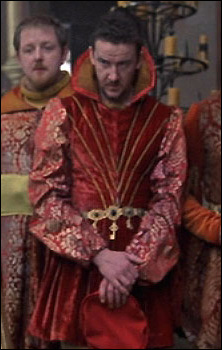 Yeshua haMashiach/Jesus Christ, the Lord of Glory likens the hypocrisy of the Pharisees to leaven, or dough which has been allowed to ferment. The smallest amount of leaven puffs up the dough. Pride, or being puffed up by the fleshly mind is like this, with a tiny lump possessing an amazing ability to spread rapidly throughout the entire body or substance. The promise of our inheritance in haMashiach/Jesus Christ, as believers is to walk as those whose conduct and manner of life has been transformed from the inside out. We must not simply "play the part," but "be the genuine article." Not as imitations of Christ, but as those who have died to the false life, and risen to walk in the newness of the Christ-life!" How do we do this? By repentance, being baptized in the name of Yeshua haMashiach/Jesus Christ for the remission of sins, and receiving the gift of the Holy Spirit. (Acts 2:38, Acts 8:16, Acts 10:46-48, Acts 19:5) We die to the former life of sin that we once lived in the flesh, vainly puffed up by the carnal mind, and rise to walk in newness of life, allowing the Spirit of the Lord to reign in us, to live in and through us, and to perform His mighty works, in demonstration of the Spirit and of power. (Mark 16:16-18)
Yeshua haMashiach/Jesus Christ, the Lord of Glory likens the hypocrisy of the Pharisees to leaven, or dough which has been allowed to ferment. The smallest amount of leaven puffs up the dough. Pride, or being puffed up by the fleshly mind is like this, with a tiny lump possessing an amazing ability to spread rapidly throughout the entire body or substance. The promise of our inheritance in haMashiach/Jesus Christ, as believers is to walk as those whose conduct and manner of life has been transformed from the inside out. We must not simply "play the part," but "be the genuine article." Not as imitations of Christ, but as those who have died to the false life, and risen to walk in the newness of the Christ-life!" How do we do this? By repentance, being baptized in the name of Yeshua haMashiach/Jesus Christ for the remission of sins, and receiving the gift of the Holy Spirit. (Acts 2:38, Acts 8:16, Acts 10:46-48, Acts 19:5) We die to the former life of sin that we once lived in the flesh, vainly puffed up by the carnal mind, and rise to walk in newness of life, allowing the Spirit of the Lord to reign in us, to live in and through us, and to perform His mighty works, in demonstration of the Spirit and of power. (Mark 16:16-18)
In all our ways, we must acknowledge the Lord, and He will direct our pathes. (Make our path straight) (Psalms 37) With all of our heart, mind, soul and strength we must live to serve God, because the intellect is susceptible to deception, if we don't allow the Spirit of the Lord to give us discernment. Discernment comes from the realm of the Spirit of God. He teaches us that which cannot be perceived through outward observation. Because our enemy is invisible, discernment gives us a distinct advantage, in the spiritual warfare which is an everyday part of living your life in haShem, God's holy name, which is Yeshua haMashiach/Jesus Christ. One must feed on God's Word, and drink from the pure stream, and not mix these, which the scripture calls Belial-- or drinking from the cup of the Lord and the cup of demons simultaneously. (I Cor. 10:21) The people of God lack discernment, when they blindly take up doctrine formulated by the Council of Nicea in 325 a.d. -- Constantine was a military strategist who did not even have himself baptized till death was near. Then he called in his long standing friend Eusebius, one of the avowed heretics the council met to denounce, to do the baptizing! The "lump was leavened" by this act to such an extent, that Christianity polarized to a large extent in the camp of intellectualism and gnosticism, and multitudes failed to ever learn to "walk even as He (Messiah) walked. (1 John 2:) Because this is a life requiring that Yeshua/Jesus be "Lord of all!"
By "spiritual perception," we see scripture in the light of divine revelation. Men of God throughout history, and the world over, testify that they were ministers of denominations, but lacked God's power, till they were baptized in the Holy Spirit. (Acts 2:1-4) This is much different than a mere intellectual pursuit of truth. Many of the bible commentaries were written by those who never spoke in tongues in their entire lives! This has caused various interpretations filled with doctrinal error to be perpetuated. When one lives a life of prayer, meditating on God's word, and perceives a portion of scripture by divine revelation, we call this perceiving a receiving of "rhema" or the quickened word from scripture. Yeshua/Jesus promised before He ascended: "When the Spirit of truth is come He will guide you into all truth." (John 14:17) This teaches the import of praying in tongues before meetings of believers, or studying God's word. It is hypocritical to be Pentecostals, and not to live a life of prayer. The New Testament believers prayer lives were patterneded after that of Judaism, which had "hours of prayer." They prayed no less than three hours a day.
The Lord identifies Himself to His people as "The Good Shepherd." (Psalm 23) He goes before His sheep, and leads and provides for them. (John 10) The body of a sheep is mainly comprised of water. Without a good shepherd to lead them to a pure drinking source, sheep will drink from every polluted water hole, and become infested with parasites.
MEMORIZE & PERFORM WHAT IS RIGHTEOUS
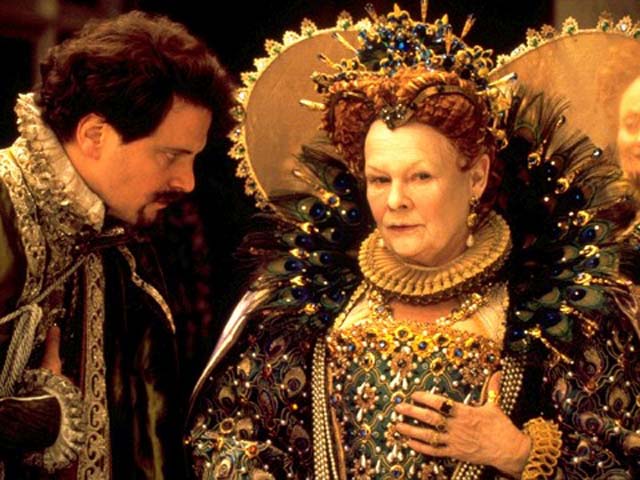
"For I have a desire to do what is good, but I cannot carry it out. For what I do is not the good I want to do, no the evil I do not want to do this I keep on doing. What a wretched man I am! Who will rescue me from this death doomed body? Thanks be to God --through Yeshua haMashiach/Jesus Christ our Lord!" (Romans 7:19)
The Apostle Paul knew a thing or two about the hypocrisy or leaven of the Pharisees. He was himself, a "lump" leavening the whole, when God in Mashiach/Christ gave him a divine encounter, that blinded him by virtue of the shekinah. For days, he couldn't even read the torah. Saul had been zealously arresting believers in Messaih, he was acting out what he felt were principles of his religion. As a devout Jew, he had been by his own testimony prior to his conversion to Messiah, a "Pharisee of the Pharisees--a descendent of Abraham from the tribe of Benjamin," (Rom. 11:1) who wanted to live the life of a holy man of God. When he was converted to Messiah, he'd lain under the glory, looking into the cloud of shekinah, and cried: Who are you Lord? Conversion made that shekinah experience a life-long experience, when God in Yeshua/Jesus placed Saul into the very shekiniah glory of the "holy of holies." Blinded for the first days after conversion, Saul was not to use his brilliant intellect to figure out how to proceed. Like his fore-father Jacob was crippled in the flesh when he met the angel of the Lord who wrestled with him at Penial, a blow was dealt to Saul's ego and intellectual pride at conversion, where he saw Yeshua face to face. Yeshua/Jesus was now his master! He said: "Now get up and go into the city, and you will be told what you must do." (Acts 9:5) Supernaturally, God gave a believer named Ananias a detailed account of this "holy-ist," Saul of Tarsus situation, saying: "He has seen in a vision, a man named Ananius come and place his hands on him to restore his sight." (Acts 9:11) In Romans 7, Paul describes the absolute necessity of God's word working in power to conform us to the image of Mesiah. As part of learning haMashiach/Christ, we must "unlearn" old concepts and descructive habit patterns. The Psalmist in Psalms 1, states: "You shall be like a tree planted by streams of water, which yields it's fruit in season and whose leaf does not wither. Whatever he does shall prosper. Not so with the wicked! They are like chaff that the wind drives away. Therefore the wicked shall not stand in the judgment nor sinners in the congregation of the righteous." Satan walks about as a roaring lion seeking whom he may devour. (I Pet. 5:8)
We must put on the full armor of God, that we might stand in the evil day, and having done all to stand. (Eph. 6) This means clothing our minds with God's word, which will renew our minds with truth.
"For though we live in the world, we do not wage war as the world does. The weapons we fight with are not the weapons of the world. On the contrary, they have divine power to demolish strongholds. We demolish arguments and every "pretention" (or hypocrisy) that sets itself up against the knowledge of God, and we take captive every thought to make it obedient to Christ. And we will be ready to punish every act of disobedience once your obedience is complete."
(2 Cor. 10:5)
SWITCHING IDENTITIES FOR LIFE
 The word "personality" is derived from an ancient Greek term, persona, meaning "mask" or "that through which is sounded." The ancient Greek theater used one actor, playing many parts by means of various masks to depict characters. In Greek theatre, masks were the "visible representation" of the person. They hid the identity or enabled the primary actor to manifest the part of a character in a play. They were tools for projecting the voice. In persona, the character was understood to be attached to the mask, not the actor, enabling him to play multiple roles, in the way in which we understand that the one true and living God is I AM. He is many things to us...He is everything that we could ever need Him to be. He is our Heavenly Father, who "prepared Himself a body, and robed Himself in Messiah, our atoning sacfifice. That's what the "incarnation" is all about! God the Saviour of the Old Testament came to earth and fulfilled the words of the prophets. Messiah is our great God and Saviour! And He is the One who comforts, and transmits truth by means of His Holy Spirit. He wants us to immerse ourselves in His word, and presence. To totally "identify ourselves with Him."
The word "personality" is derived from an ancient Greek term, persona, meaning "mask" or "that through which is sounded." The ancient Greek theater used one actor, playing many parts by means of various masks to depict characters. In Greek theatre, masks were the "visible representation" of the person. They hid the identity or enabled the primary actor to manifest the part of a character in a play. They were tools for projecting the voice. In persona, the character was understood to be attached to the mask, not the actor, enabling him to play multiple roles, in the way in which we understand that the one true and living God is I AM. He is many things to us...He is everything that we could ever need Him to be. He is our Heavenly Father, who "prepared Himself a body, and robed Himself in Messiah, our atoning sacfifice. That's what the "incarnation" is all about! God the Saviour of the Old Testament came to earth and fulfilled the words of the prophets. Messiah is our great God and Saviour! And He is the One who comforts, and transmits truth by means of His Holy Spirit. He wants us to immerse ourselves in His word, and presence. To totally "identify ourselves with Him."
The true life of the New Testament believer, or the believer's "real self," is the man haMashiach/Christ Jesus formed within us at baptism. (2 Cor. 5:17; Gal. 4:19), the "new man" who is born at baptism. (Jn. 3:3; Eph. 4:24). Therefore we have been buried with Him in baptism, into newness of life in order that as Mashiach/Christ was raised from the dead through the glory of the Father, so we too might walk in newness of life." (Romans 6:4) "It's no longer I that lives, but Mashiach/Christ that lives in me." (Gal. 2:19-20) The Spirit of Messiah "sounds through us!" God's purpose is to "reveal His Son in us! (Gal. 1:15-16) Lift up your voice like a trumpet. (Isaiah 58:1)
THE SPIRIT REVEALED THE GOD OF ALL COMFORT
 Yeshua said to His disciples: "Nevertheless I tell you the truth; It is expedient for you that I go away: for if I go not away, the Comforter will not come unto you; but if I depart, I will send him unto you." (John 16:20) I will not leave you Comfortless, but I will come unto you! (John 14:18) In that day, you will know that I am in My Father, and you in Me and I in you. (John 14:20)
Yeshua said to His disciples: "Nevertheless I tell you the truth; It is expedient for you that I go away: for if I go not away, the Comforter will not come unto you; but if I depart, I will send him unto you." (John 16:20) I will not leave you Comfortless, but I will come unto you! (John 14:18) In that day, you will know that I am in My Father, and you in Me and I in you. (John 14:20)
Note that Yeshua says:
"I will not leave you Comfortless, but I will come to you."
God in haMashiach/Christ was stating that He would not leave God's people orphans. God still comes to us in haMashiach/Christ, and not another. This is vividly described in Saul of Tarsus encounter. (Acts 9:5) The apostles said the Spirit of Yeshua/Jesus forbid them to go into Bithynia. (Acts 16:7)
Now the Lord is the Spirit! And where the Spirit of the Lord is, there is freedom. And we who with unveiled faces all reflect the Lord's glory, are being transformed into His likeness, with ever-increasing glory, which comes from the Lord, who is "The Spirit." (2 Cor. 3:18)
When you get to heaven, you will experience God in Christ. There is no revelation of God apart from Messiah. He was saying in essence: I can not be everywhere present while in the body of this flesh. For your sakes, it is expedient that I pay the redemption price for the forgiveness of your sins, raise from the dead and ascend into heaven. Then I will send the Holy Spirit. I will be with you forever, in the Holy Spirit. God, who is Spirit was "in Mashiach and Mashiach was in Him, while He was on earth." (John 14:10) In testifying of Him, John the Baptist, said: He shall baptise you with the Holy Spirit and with fire. (This came to pass dramatically on the day of Pentecost (Acts 2:1-4) when believers received the indwelling of the Holy Spirit promised by Messiah. John 7:38)
SHOW US THE FATHER
 Philip the Disciple said:
Philip the Disciple said:
"Show us the Father and we'll be satisfied: And Messiah said: Have I been so long a time with you Philip and yet you have not known Me? He that has seen me has seen the father. I and my Father are one!"
God "sounded through Him," and He said: "The words that I speak to you I do not speak on my own initiave, but the father abiding in me does the works." (John 14:10) Yeshua/Jesus didn't merely "act the part of the Father." The New Testament in speaking of the oneness of the believer with Messiah, says: He that is joined to the Lord is "one Spirit." Bone of His bones and flesh of His flesh. The believer dare not simply "imitate" Mashiach/Christ, as Thomas Kemper's book suggests. As believers, we must be the revelation of Yeshua/Christ, because His abiding presence is in us.
MESSIAH AS ROCK AND FOUNDATION STONE
The Apostle Paul stated that it pleased God who separated him from his mothers womb to "reveal His Son in him" that he might preach him among the heathen. (Gal. 1:16) This revelation is a full time thing. It's not just a part played for a certain audience, after which you turn, exit the stage, remove the grease paint and go home. Messiah manifested the true and living God with His entire manner of life, because He is God. Never did He shrink from this responsibility, to which He's been called, as our Rock and Chief Cornerstone. He wasn't an imitation of the Lord. The world into which He was born, was filled with imitations already. They cried for deliverance. They cried to God: "Hosannah: Save now!" He wasn't just "acting the part." He is Yeshua/Jesus meaning: Yahweh our Salvation. He is Immanuel: God with us.
The concept of Yeshua/Jesus as the Spirit of God is seen in the story in which Saul of Tarsus having a divine encounter with the Spirit of the Living Christ on the road to Damascus. (Acts 9:5) Where else do we see this concept? We see this in the messages to the Seven Churches of Asia, where 7 times the speaker says: Let he that has an ear hear what "The Spirit" says to the churches, but in every case, the speaker is identified by one of the names or titles of Yeshua. (Rev. 1-3)
Therefore thus says the Lord God: "Behold, I am laying in Zion a Stone, a tested stone, a costly cornerstone, for the foundation, firmly placed. He that believes shall not be anxious. (Isaiah 28:16)
Hebrews 1:3, employs the term "hupostasis," "that which lies under," substratum, with the KJV rendering this as "person," i.e. "the express image of his person," meaning, "of God," which the Revised Version (British and American) renders "the very image of his substance," margin "the impress of his substance," i.e. the manifestation or expression of the invisible God and Father.
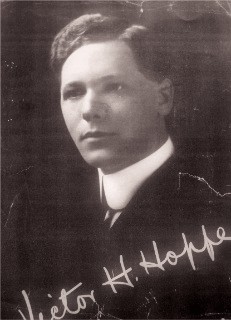
Drama professor Victor Hugo Hoppe died in 1955. He is laid to rest at Greenacres Memorial Park, Whatcom County, Washington.
ELIZABETHAN PUPPET SHOWS
In the Middle Ages, puppets were used to perform liturgical dramas developed from Christmas nativity plays. During the later Middle Ages, when regular miracle-plays were becoming old-fashioned, more elaborate marionettes, handed down through the minstrels from Roman times, began to appear.
Shakespeare's knowledge of puppet shows "O excellent motion! O exceeding puppet! Now will he interpret to her." (Speed in The Two Gentlemen of Verona, 2. 1. 96-97)
Motion A puppet show. Hamlet to Ophelia: "I could interpret between you and your love, if I could see the puppets dallying" (3. 2. 250-251).
In The Winter's Tale, Autolycus "compassed a motion of the Prodigal Son" (4. 3. 96-97).
EARLY PLAYS

Folk drama -- mummers' plays, jugglers, ballad singers -- had always flourished in the festivals and fairs of country and city. These were part of a rich pre-literate oral culture. The earliest formal -- written -- plays performed in England were dramatizations of Biblical stories, from those like the short musical performance at the tomb of the risen Christ, the Quem Quaeritis, to extensive and sophisticated short dramas about the nativity, the crucifixion, and the Day of Judgement.
Mystery plays and Miracle plays are among the earliest formally developed plays in medieval Europe. Medieval mystery plays focused on the representation of Bible stories in churches as tableaux with accompanying antiphonal song. They developed from the 10th to the 16th century, reaching the height of their popularity in the 15th century before being rendered obsolete by the rise of professional theatre. The name derives from mystery used in its sense of miracle, but an occasionally quoted derivation is from misterium, meaning craft, a play performed by the craft guilds.
The "mystery"plays, as they came to be called, were performed on platforms, or carts, that moved around the city to various "stations" where the audience gathered.
The biblical scenes that made up the mystery play were staged by the various guilds: at York the play of Noah was put on by the carpenter's guild, no doubt because they could build the ark most effectively.
The scene here is of a continental mystery play, with different "houses" where the action could take place; click for an example recorded in Shakespeare's time.
Soon the plays were taken over by the religious and professional guilds, with each guild taking responsibility for a particular episode or set of episodes from scriptural history. One guild, for example, might present the Fall, another the Flood, and yet another the Crucifixion and the Resurrection. The trade guilds were called "mysteries," from the Latin for "handicraft" or "office," and that is why this type of drama came to be known as "mystery plays" (often simply called "mysteries"). The involvement of the trade guilds reinforced the tendency to incorporate topical and social themes into the plays, though the emphasis remained on God's relationship with man and on the promise of salvation through Christ.
Once the religious dramas had been removed from the church and the control of the clergy and appropriated by the trade guilds, they became progressively secularized, even incorporating elements (including ribaldry) from popular farce. They became boisterous and realistic in tone and style, often moving from serious religious subjects to topical farce and back, as in the well known "The Second Shepherd's Play" from the Wakefield cycle. It was this increasing secularization and farcical elaboration that led the Church to withdraw official approval from the mystery and miracle plays, and finally to suppress them altogether in England following the Reformation in the sixteenth century.
INTERVIEW WITH PROFESSOR HOPPE'S DAUGHTER JOAN CAMPBELL
JC: Another funny thing. My dad wrote the script for the Tulip Festival, which went on for years. So I got to be [on] the float. I always got to be [on] the queen’s float. I was a page or something, that was because my dad wrote the [program]. I said I didn’t participate in any of his plays, but I did one time. It must have been when I was five years old, probably, Kindergarten or First-grade, and I was going to be a fairy in Midsummer Night’s Dream I thought, “Oh, boy, I’ll probably have a gorgeous costume.” I was the moth! My mother dyed some cheesecloth gray and that was my costume. My friends had these lovely costumes. That was a blow. But I got to be part of it. I think I even had one speaking line.
TB: So, tell me a little bit more about the Tulip Parade. What kind of script was there?
JC: Well, there was a pageant, is what it was. In fact, I wonder if I still have a copy of that. I have a lot of my dad’s stuff.
TB: Oh, you do have some of your dad’s stuff.
JC: Well, just pictures and some of it goes clear back to when he was in college, because he was doing a lot of speaking.
TB: So do you have some of his speeches or different scripts that he used when he did his work?
JC: Well, the plays. I have a lot of his play books that are all marked for direction, just his little paper back play books. What do you do with them?
TB: Oh, we’d love them. How hard was it for your father to retire?
JC: Well, he didn’t retire at 65. I think he taught at least … see, he died at 70, so he hadn’t been retired all that long. I think he retired at 67 and he only lived three years after that.
TB: Wow. Any thoughts for him when they built the new auditorium? Did he like that or he didn’t like that?
JC: Oh, yes. Of course, he did Shakespeare. Of course before that he did Shakespeare on the knoll. Is the knoll still there?
TB: Yes.
JC: Yes, and that was a perfect place for something like A Midsummer Night’s Dream. He did several things on the knoll. Then, of course, when they built the [auditorium] I remember him doing The Merchant of Venice, not even in the stage, but in that narthex, the front part of the…with the stairway coming down, they used that instead of the stage. He played Shylock of course. He always played Shylock when they did The Merchant of Venice.
TB: Now, do you know why he liked Shakespeare so much?
JC: Oh, heavens. He had gotten that years before, I mean, he was just a Shakespeare buff. It must have been his own professors, he went to Denison University. He actually could have gone on the professional stage. He had an opportunity; he could have been an actor, a professional actor. But he chose to be a teacher. I just grew up with Shakespeare -- that was his love.
TB: Did you know Angus Bowmer?
JC: Yes.
TB: Do you want to talk a little bit about their relationship?
JC: He was what we called a perpetual school boy. He was in school for a long time after, he kept coming back. And of course, dad was really his mentor. He was in practically every play. During the time he was in school, he was in every play that dad did. I’m sure that’s what inspired him to start acting.
TB: He credited your father with that, he wrote a book.
JC: Yes, he said dad was his mentor.
Special Collections Oral History Program
Index-Joan (Hoppe) Campbell
Campus School, 1922-1930
WWU, 1934-1937, "Special Normal Diploma"
Campus School parent, 1951-1965
Date of Interview: September 16, 2005
MEDIEVAL HERB BREAD
Ingredients:
2 pkgs. yeast
2 c. warm water
6 eggs
1 1/4 tsp. s
alt
6 tbsp. oil
1 1/2 tsp. rosemary
2/3 c. parsley
8 c. flour
1 egg for top
Directions:
Dissolve yeast in water. Combine eggs, salt, oil, herbs and 3 cups flour. Add yeast and mix well. Add more flour to make dough and knead on floured board for 10 minutes. Place in greased bowl and cover. Let rise for 1 1/2 hours in warm place. Shape into two loaves on cookie sheet. Cover loosely and let rise for 45 minutes. Brush with egg and bake for 50 minutes at 375 degrees.
____________________________________________________

